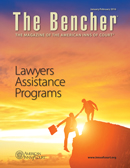Lawyer Assistance Programs and Attorney Discipline Agencies
The Bencher—January/February 2016
By John P. Ratnaswamy, Esquire

 This is the third time I have written a column relating to substance abuse and attorney discipline. The main reason for the recurrence of this subject is simple and it is sad for lawyers and clients alike. Alcohol and other substance abuse long have been and remain a major cause of lawyer conduct that leads to disciplinary proceedings. For example, in Illinois in 2014, 27% of lawyers disciplined had at least one substance abuse or mental impairment issue. ARDC Annual Report of 2014, p. 29.
This is the third time I have written a column relating to substance abuse and attorney discipline. The main reason for the recurrence of this subject is simple and it is sad for lawyers and clients alike. Alcohol and other substance abuse long have been and remain a major cause of lawyer conduct that leads to disciplinary proceedings. For example, in Illinois in 2014, 27% of lawyers disciplined had at least one substance abuse or mental impairment issue. ARDC Annual Report of 2014, p. 29.
My March/April 2005 column in The Bencher on “Impaired Colleagues” focused on addressing situations when a lawyer knows or believe that another lawyer suffers from a mental impairment that jeopardizes the ability of the lawyer to comply with, or that has resulted in a violation of, the lawyer rules of conduct. I discussed two American Bar Association (ABA) ethics opinions: Formal Opinion No. 03-429, “Obligations With Respect to Mentally Impaired Lawyer in the Firm” (June 11, 2003), and Formal Opinion No. 03431, “Lawyer’s Duty to Report Rule Violations by Another Lawyer Who May Suffer from Disability or Impairment” (August 8, 2003).
My September/October 2001 column on “Substance Abuse and Lawyer Discipline” focused on the interplay of mandatory reporting of some disciplinary rule violations and referring an attorney to a lawyer assistance program. ABA Model Rule of Professional Conduct 8.3 is the primary rule on mandatory reporting of professional misconduct, but one of its exceptions is for disclosure of “information gained by a lawyer or judge while participating in an approved lawyers assistance program.”
In this column, I wish to make the points that lawyer assistance programs commonly work closely with lawyer disciplinary agencies, and that they do so in a variety of ways. To begin with, the 2014 Comprehensive Survey of Lawyer Assistance Programs (“Survey”) of the ABA’s Commission on Lawyer Assistance Programs stated that 88% of LAPs reported disciplinary agencies as a source of referrals. Disciplinary agency referrals made up 9.2% of all referrals. Survey, pp. 6, 12, 18. (The top source, by far, was self-referral, at nearly 45%. Id., p. 18. Disciplinary agencies were second, followed closely by lawyer admissions agencies. Id.) (There were 52 respondents overall to the Survey, a response rate of 96%. Not every respondent answered every question. Many of the results referenced in this column came from roughly 40 respondents.)
The relationship functions, however, in both directions. 89% of LAPs stated that they provide services for disciplinary agencies. Survey, p. 34. 89% also reported that they provide services for lawyer admissions agencies. Id.
More specifically, LAPs provided a wide variety of services for disciplinary agencies. The types of services programs provided for discipline included: monitoring (83%), the development of a contract (68%), drug/alcohol screening (55%), assessments/evaluations (70%), support groups (63%), and 12-step calls (45%). Survey, p. 35.
Despite the extent of their services, not just in relation to disciplinary issues but generally, LAPs rated under-utilization, however, as the most pressing problem of those listed in the survey. Nearly 40% of LAPs rated this as one of their three most pressing problems. Survey, pp. 20, 50 (42 respondents). Moreover, the second and fourth highest rated problems were lack of awareness on the part of members of the bar (25%) and lack of awareness on the part of judges (17%). Id.
For the sake of lawyers and clients alike, we all can hope that awareness increases and that more lawyers will find help that works, whether from LAPs or otherwise.
John Ratnaswamy, Esquire, is a partner in the Chicago law firm of Rooney Rippie & Ratnaswamy LLP. He also serves as an Adjunct Professor of Legal Ethics at the Northwestern University School of Law. He is a former member of the American Bar Association’s Standing Committee on Ethics and Professional Responsibility and a current member of the Hearing Board of the Illinois Attorney Registration & Disciplinary Commission. This column should not be understood to represent the views of any of those entities or John’s or the firm’s current or former clients
© 2016 JOHN P. RATNASWAMY, ESQ. This article was originally published in the January/February 2016 issue of The Bencher, a bi-monthly publication of the American Inns of Court. This article, in full or in part, may not be copied, reprinted, distributed, or stored electronically in any form without the express written consent of the American Inns of Court.